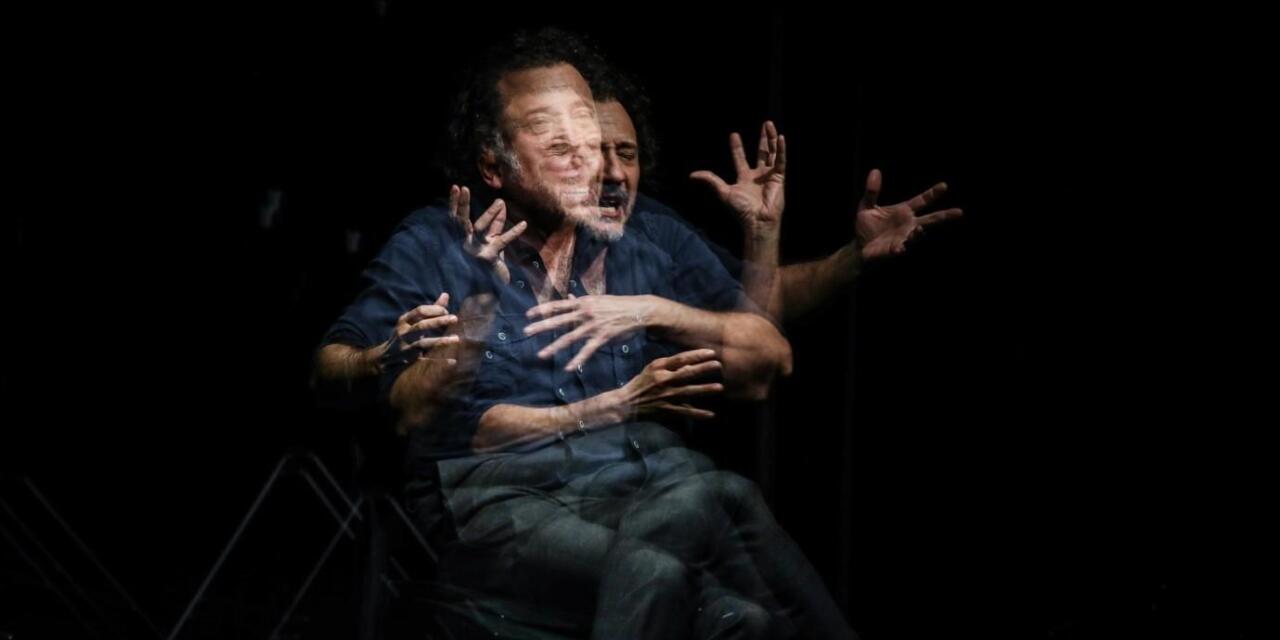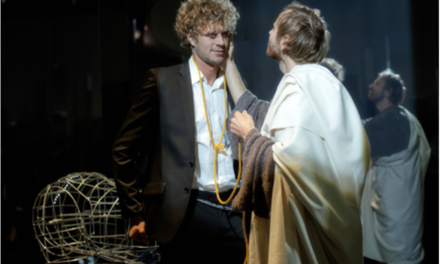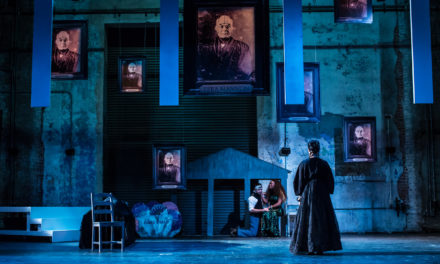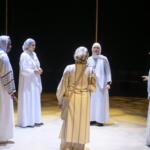In October 2025, Battersea Arts Centre hosted Aşınma (Corrosion) – a multi-award-winning theatre work in Turkish by the innovative Turkish writer-director Şahika Tekand and the esteemed actor Yiğit Özşener.
We are in the Council Chamber at the BAC – a black box stage. At the center sits a three-dimensional cube frame made with metal sticks. Around this structure, there are LED-light panels that are used to give direct commands to Özşener who is sitting calmly on a chair in the middle of this cubical design before delivering a heart-pounding solo performance that will hit and lift its audience all at the same time.
Written and directed by the renowned practitioner Tekand, Aşınma draws directly on Tekand’s previous work Fear of Darkness (2008) and illustrates her decades-long exploration of ‘performative staging and acting method’ which is based on the superposition of actor and character, play and player, theatre and life in the here and now of actor and audience. Performed dexterously by Tekand’s long-term collaborator at Studio Players (Istanbul), Özşener, Aşınma offers an arresting meditation on what it means to be human today. It reflects on how we corrode as we try to fit in, resist, give in and exit the systems that rule us, whether you are facing the inequalities, capitalist pressures and oppressive measures in Turkey or in England – or indeed, anywhere at all.
For 55 minutes we are captivated by Özşener’s fast-paced and seamless delivery of the unnamed protagonist’s struggle to grasp, adapt to, conform and defy the realities surrounding and presiding his life. The realities are easy to recognize for anyone living in the contemporary world – poverty, war, oppression, climate crisis, consumer culture, injustices and inequalities. What is striking is the feeling of how one’s humanity corrodes while trying to ‘be oneself’ and be a decent human while these realities push one into something that they are not, as the character compellingly puts: “Constantly fulfilling what is expected of you, and longing to be like yourself.”
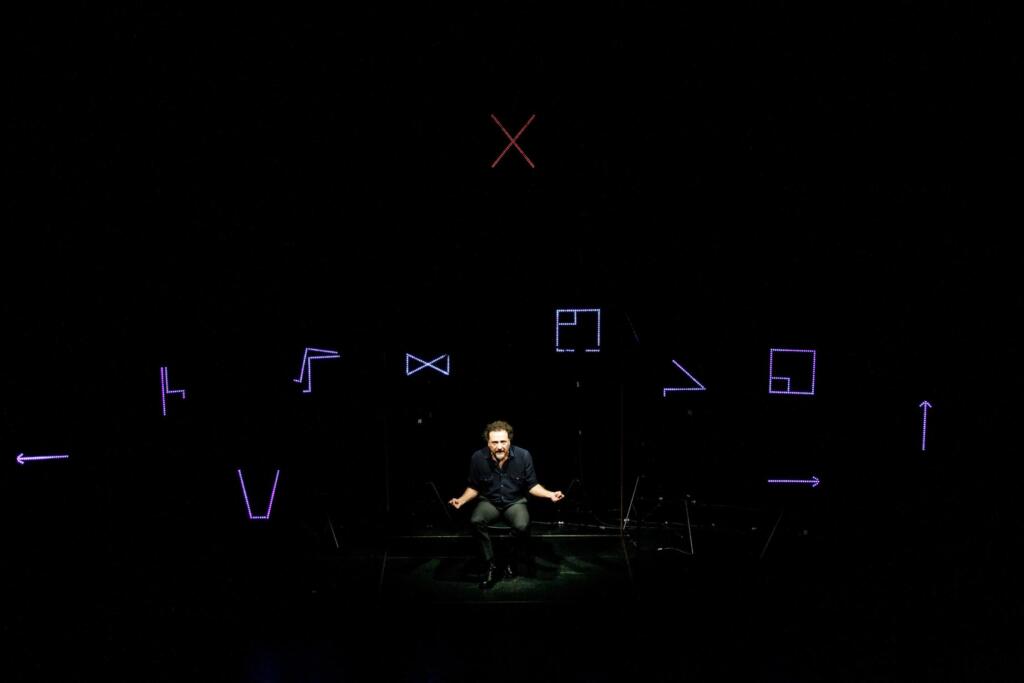
Aşınma (Corrosion), written and directed by Şahika Tekand, starring Yiğit Özşener. Photo credit: Cem Gültepe. Photo credit: Emre Mollaoglu.
Whilst speedily uttering a torrent of fragmented thoughts and memories, Özşener is also trying to follow intrusive commands given to him through light panels and sound cues. He is playing a game, which he as an actor and we as audiences try to simultaneously figure out, as the rules of the game are disclosed through light and sound prompts. The game-within-a-play is a conspicuous manifestation of Tekand’s eminent ‘performative staging method’ which uses game design and rules to generate and juxtapose a performer’s lived experience and their character’s story in real time, continually blurring the boundaries between character and actor, theatre and life, and fiction and reality. On stage, the visual commands are direct: cross arms, cross legs, hand on face, turn left/right. Every time Özşener tries to say or do something outside the commands, a loud, jarring noise puts him in his place. The commands are constantly disrupting what the performer has to say or do, and shape his body, language and ultimately his performance by forcing him to do as he is told within the literal frame and symbolic borders within which he is trapped. Here, it is both Özşener’s performance as an actor and the character’s existence as a human that are molded by the rules. The more they follow and conform to these structures, the more they become entrapped and ultimately dissolve in the culture of homogeneity where differences and resistance are repressed and not tolerated.
One of the most remarkable moments in the performance is when Özşener identifies our contemporary existence through an analogy: we each live ‘like a frog in slowly heated water that is designed completely outside our will’. Then, he concludes: ‘the most frightening thing is the possibility that we may have exhausted the strength and means to get ourselves out of the water that has already started to boil.’ Following this, Özşener poses philosophical questions by simply using the chair he has been sitting on throughout the performance. He tells us about how uncomfortable the chair is and emphasizes that the problem is not about the chair, but about the relationship between the chair and his arse. He then points out that he needs to change the form of this relationship by standing up and leaving. As he stands up and gravitates towards the exit, he stops and remains within the boundaries of the frame: ‘There must be another way to act’. As our differences and our freedom of mind and body are corroded into a muted state of being, we become increasingly afraid of nothing but fear itself. The character is afraid of leaving and more so of the fear of what might happen if he gets out. It is this fear that rules and entraps us, eroding our agency and capacity to challenge or break away from the structures surrounding us. On stage Özşener asks: ‘If a person cannot know, cannot ask, cannot remember or cannot think, how can they find it strange? […] Will there never be hope again?’
Aşınma is a revelatory and hopeful outcry against the oppressive regimes we live in – whether you are living in an extremely prohibitive one which precludes debate and antagonistic engagement, or in a so-called liberal regime where the spectrum of acceptable opinion is limited and freedom of expression is systematically predetermined. By asking these questions, Aşınma spotlights the structures that corrode us in today’s world. It makes visible the systems that are deeply ingrained in our everyday existence, inviting us to see, think about and question them, and think otherwise. Özşener’s performance is an act of impressive artistry and is nothing less than exceptional; his immaculate use of language with dazzling speed and his expressive use of his body in accordance with the audio-visual commands held his audience spellbound. Mesmerized by his electrifying performance, the audience asked Özşener during the Q&A whether he thinks that theatre can revolutionize society. In a way reminiscent of Agusto Boal, Özşener responded: ‘I don’t think theatre can revolutionise society, but it can transform the people that will make the revolution possible.’ Aşınma leaves us with a sense of valor and hope; the revolution begins there – deep within us.
Aşınma / Corrosion
October, 2025
Battersea Arts Centre
This post was written by the author in their personal capacity.The opinions expressed in this article are the author’s own and do not reflect the view of The Theatre Times, their staff or collaborators.

